Dozens of Hong Kong opposition figures have spent four days in court already this week to see if they will be jailed for months ahead of their trials on national security charges, but the unusually long arraignment might have already done lasting damage to the judiciary’s reputation.
The 47 defendants — including prominent democracy advocates Joshua Wong (黃之鋒), Benny Tai (戴耀廷) and Jimmy Sham (岑子杰), as well as numerous past and current lawmakers — have been in and out of court since Monday. Sessions have stretched late into the night, prompting some defendants to seek hospital care, and causing foreign observers to wonder whether the conditions made it harder to mount a sufficient defense and provided possible grounds for appeal.
The hearings resumed for a fourth day yesterday, after adjourning the previous session at 8:30pm. The first day lasted from 11am on Monday until about 3am on Tuesday, after one defendant collapsed and was taken to a hospital.
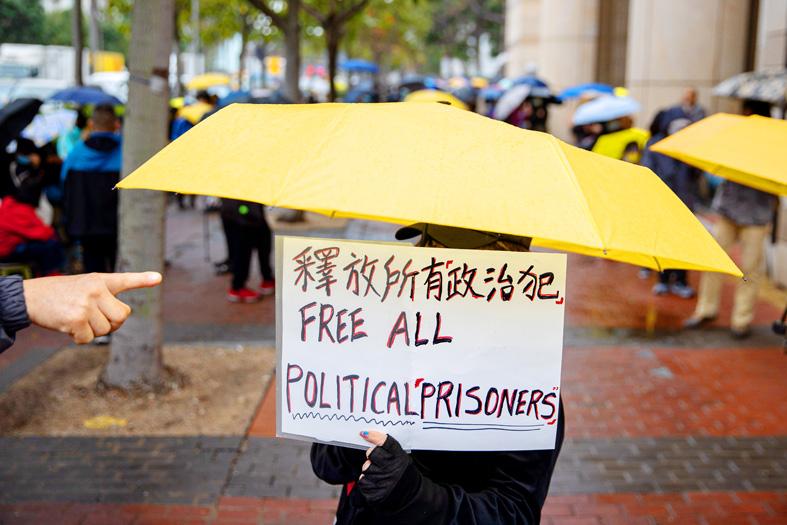
Photo: EPA-EFE
At least five others have since been taken to the hospital after saying they felt unwell, local media reported.
“The unprecedented marathon, almost around-the-clock, four-day hearing makes a farce of procedural fairness,” said Jerome Cohen, founder of the US-Asia Law Institute at the New York University School of Law and one of the US’ foremost legal experts on China. “No single magistrate can fairly deal with the individual circumstances of 47 different bail applications in such a short time.”
“The court system should never have arranged such a chaotic judicial review that has made Hong Kong’s formerly revered judicial system look like the willing instrument of the police and prosecution,” Cohen said.
The Hong Kong Department of Justice said in a statement on Tuesday that demanding the defendants’ release “undermines the rule of law and is seen as an attempt to meddle in Hong Kong’s affairs, which are internal affairs of the People’s Republic of China.”
The 47 were charged with “conspiracy to subversion” over their roles in a primary vote in July last year that drew 600,000 participants ahead of planned Legislative Council elections that were later delayed.
“In many ways, it’s the government putting Hong Kong’s legal system in jeopardy — they don’t seem to pause and think how bad this looks for Hong Kong,” said Michael Davis, a professor of law and international affairs at O.P. Jindal Global University in India.
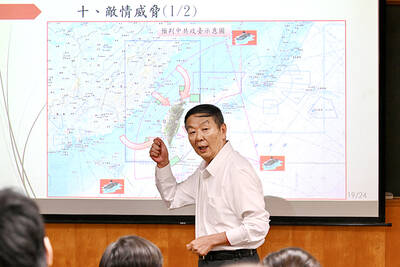
RETHINK? The defense ministry and Navy Command Headquarters could take over the indigenous submarine project and change its production timeline, a source said Admiral Huang Shu-kuang’s (黃曙光) resignation as head of the Indigenous Submarine Program and as a member of the National Security Council could affect the production of submarines, a source said yesterday. Huang in a statement last night said he had decided to resign due to national security concerns while expressing the hope that it would put a stop to political wrangling that only undermines the advancement of the nation’s defense capabilities. Taiwan People’s Party Legislator Vivian Huang (黃珊珊) yesterday said that the admiral, her older brother, felt it was time for him to step down and that he had completed what he
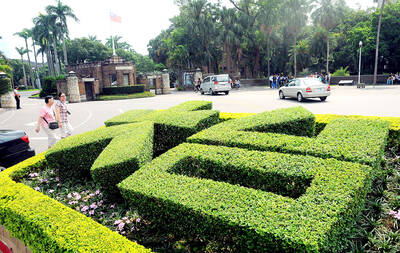
Taiwan has experienced its most significant improvement in the QS World University Rankings by Subject, data provided on Sunday by international higher education analyst Quacquarelli Symonds (QS) showed. Compared with last year’s edition of the rankings, which measure academic excellence and influence, Taiwanese universities made great improvements in the H Index metric, which evaluates research productivity and its impact, with a notable 30 percent increase overall, QS said. Taiwanese universities also made notable progress in the Citations per Paper metric, which measures the impact of research, achieving a 13 percent increase. Taiwanese universities gained 10 percent in Academic Reputation, but declined 18 percent
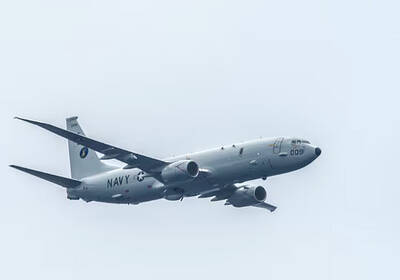
CHINA REACTS: The patrol and reconnaissance plane ‘transited the Taiwan Strait in international airspace,’ the 7th Fleet said, while Taipei said it saw nothing unusual The US 7th Fleet yesterday said that a US Navy P-8A Poseidon flew through the Taiwan Strait, a day after US and Chinese defense heads held their first talks since November 2022 in an effort to reduce regional tensions. The patrol and reconnaissance plane “transited the Taiwan Strait in international airspace,” the 7th Fleet said in a news release. “By operating within the Taiwan Strait in accordance with international law, the United States upholds the navigational rights and freedoms of all nations.” In a separate statement, the Ministry of National Defense said that it monitored nearby waters and airspace as the aircraft
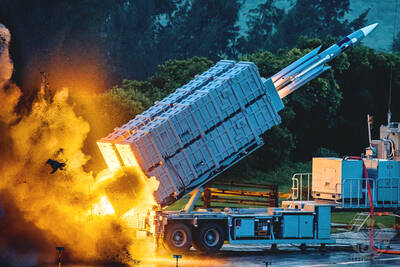
UNDER DISCUSSION: The combatant command would integrate fast attack boat and anti-ship missile groups to defend waters closest to the coastline, a source said The military could establish a new combatant command as early as 2026, which would be tasked with defending Taiwan’s territorial waters 24 nautical miles (44.4km) from the nation’s coastline, a source familiar with the matter said yesterday. The new command, which would fall under the Naval Command Headquarters, would be led by a vice admiral and integrate existing fast attack boat and anti-ship missile groups, along with the Naval Maritime Surveillance and Reconnaissance Command, said the source, who asked to remain anonymous. It could be launched by 2026, but details are being discussed and no final timetable has been announced, the source